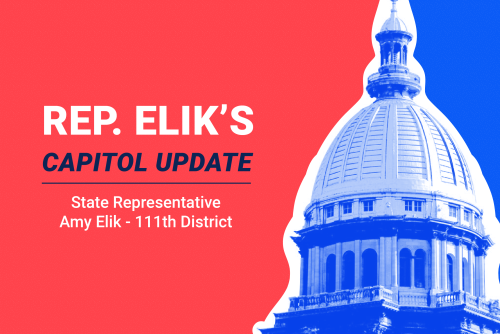I hope you are enjoying your summer as we approach the fall season. Here is a brief update on recent news in Illinois.
270 Mississippi River Bridge Tour
Earlier this week I was invited by the Transportation for Illinois Coalition and Southern Illinois Builders Association for a tour of the 270 Mississippi River bridge site. It’s always fascinating to me how these massive projects come together, thanks to the hard-working men and women of local skilled labor, talented engineers, and so many others, and in cooperation with numerous government agencies.
The plan is: eastbound lanes are being built now. Once ready, traffic will flow both ways on that bridge while the old bridge is demolished and the new westbound lanes are built. By the end of 2026 (fingers crossed!) both bridges will be done allowing much better traffic flow both ways. This is a joint project between IL and MO.


Criminals will be able to get out of jail free beginning September 18
The State has set Monday, September 18, as the first day in which Illinois courts will no longer be able to hold a hearing and demand that a criminal defendant post cash bail as a condition of pretrial release. I am opposed to this new law.
The controversial law, enacted by Democrats in January 2021 within a lame-duck midnight session of the 101st General Assembly (just hours before I was sworn into office), told the courts they may no longer hold cash-bail bond hearings and order a defendant to post cash bail. House Republicans voted “no” against the new law. Many law enforcement officers protested against this law, and its constitutionality was litigated up to the level of the Illinois Supreme Court. The state’s highest court ruled in favor of the new law in July. This Supreme Court decision, and the underlying partisan statute, will bind the criminal courts of Illinois on September 18 and thereafter.
Federal Census Bureau redraws the statistical-area map of Illinois
The Census Bureau’s formulas define most Americans, including most of the residents of Illinois, as residents of statistical areas that center on a small city, a big city, or a very big city. The post-2020 census map of Illinois defines these areas as combined statistical areas, metropolitan statistical areas, and micropolitan statistical areas, depending on the size of the central city and how large is the area that it influences.
The central city of an Illinois statistical area may be a large city, like Chicago or St. Louis; a medium-sized city, like Champaign-Urbana or Rockford; or a small city, like Effingham or Mount Vernon. If the central city has a census population below 50,000, the statistical area is likely to be classified as a “micropolitan” area rather than as a metropolitan area. In any case, many Illinois residents may be surprised to find that, in the eyes of the federal government, they live in an urban statistical area.
Census statistical maps are significant for many reasons other than telling people where they live. They are used by health planners when siting new capital resources where physicians and other health care providers offer services; they are used as one of the components in the definition of so-called “underserved areas” to which attention to health care and other items of local infrastructure are required; and they are used by private businesses to sell things, particularly in the advertisements that run on the Internet and on cable television.
Investigation uncovers evidence of massive pandemic fraud among many public-sector employees
The findings, released this week by Illinois Executive Inspector General Susan Haling, include preliminary evidence that indicates that at least 177 State of Illinois employees filed incorrect claims with the federally-mandated Paycheck Protection Program (PPP). This program, created under crisis conditions by Congress in the spring of 2020, tried to generate emergency financial survival help for people made jobless by the COVID-19 pandemic. Shutdown orders in Illinois and many other states had led not only to massive layoffs, but sharp drops in cash flow for many independent contractors and small businesses. Federal COVID-19 assistance was intended to help all Americans, including independent contractors and people with small businesses.
The 177 individuals in the preliminary investigation may unfortunately be only a subset of the total roll of alleged PPP fraudsters in Illinois. The cases mentioned by Inspector General Haling have been referred to the Office of the Illinois Attorney General for further action.
Need assistance with state government?
If you have an issue or need help navigating state government. My office is here to help you. If my office may be of assistance please contact my district office in Alton at 618-433-8046.
